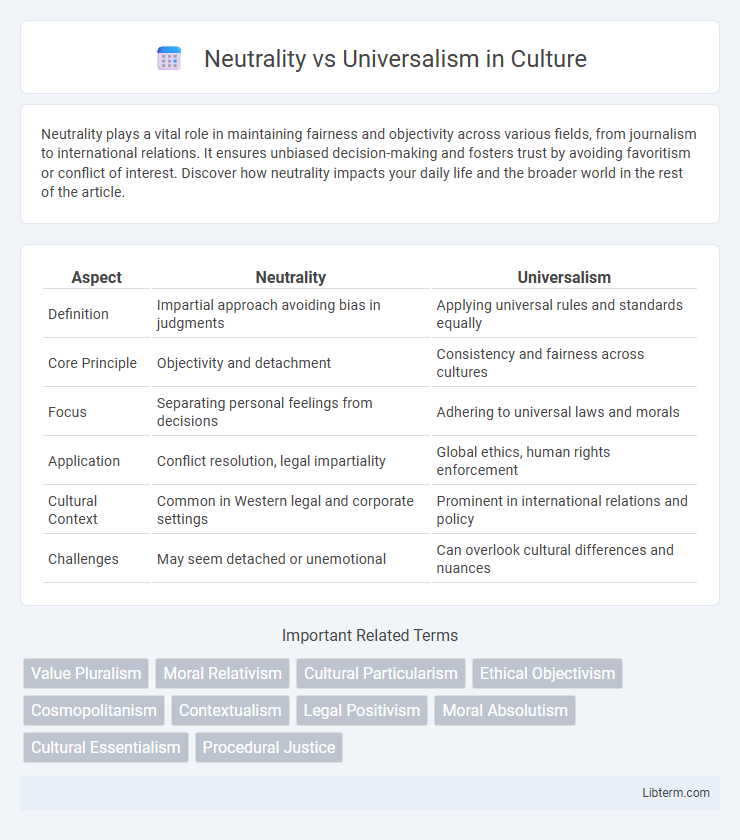Neutrality plays a vital role in maintaining fairness and objectivity across various fields, from journalism to international relations. It ensures unbiased decision-making and fosters trust by avoiding favoritism or conflict of interest. Discover how neutrality impacts your daily life and the broader world in the rest of the article.
Table of Comparison
| Aspect | Neutrality | Universalism |
|---|---|---|
| Definition | Impartial approach avoiding bias in judgments | Applying universal rules and standards equally |
| Core Principle | Objectivity and detachment | Consistency and fairness across cultures |
| Focus | Separating personal feelings from decisions | Adhering to universal laws and morals |
| Application | Conflict resolution, legal impartiality | Global ethics, human rights enforcement |
| Cultural Context | Common in Western legal and corporate settings | Prominent in international relations and policy |
| Challenges | May seem detached or unemotional | Can overlook cultural differences and nuances |
Defining Neutrality: Principles and Perspectives
Neutrality refers to the principle of impartiality, avoiding bias or favoritism toward any party, perspective, or outcome. It emphasizes equal treatment and non-interference, often applied in conflict resolution, journalism, and diplomatic contexts to maintain objectivity. Perspectives on neutrality vary, with some arguing it supports fairness by withholding judgment, while others contend it can perpetuate systemic inequalities by ignoring power imbalances.
Understanding Universalism: Core Concepts
Universalism emphasizes the application of ethical principles and human rights universally, transcending cultural and national boundaries to ensure equal treatment for all individuals. It asserts that certain values and rights are inherently valid regardless of local customs or beliefs, promoting global justice and fairness. This approach contrasts with neutrality by actively advocating for universal standards rather than refraining from judgment or interference.
Historical Contexts of Neutrality and Universalism
Historical contexts reveal neutrality as a principle rooted in diplomatic practices, especially prominent during the 19th and 20th centuries in international relations, where states aimed to avoid alliances and conflicts. Universalism emerged from Enlightenment and post-Enlightenment philosophies, emphasizing global human rights and moral principles applicable to all individuals regardless of cultural or national differences. The contrast between neutrality and universalism highlights the shift from state-centric non-intervention policies to the advocacy for universal norms transcending national boundaries.
Ethics: Moral Foundations of Neutrality vs Universalism
Neutrality in ethics emphasizes impartiality and refraining from taking sides in moral disputes, promoting fairness through unbiased judgment. Universalism, grounded in moral foundations such as justice and human rights, asserts that ethical principles apply to all individuals regardless of cultural or contextual differences. The debate between neutrality and universalism hinges on whether moral norms should be context-dependent or universally binding, shaping contemporary ethical frameworks in global justice and human rights discourse.
Neutrality in International Relations and Diplomacy
Neutrality in international relations serves as a strategic stance where states abstain from participating in conflicts or alliances, maintaining impartiality to safeguard sovereignty and security. It enables diplomatic mediation by acting as an unbiased intermediary in negotiations, fostering peace and stability among conflicting parties. Neutral states often adhere to international law principles, reinforcing their credibility and facilitating trust-building in global diplomacy.
Universalism in Human Rights Discourse
Universalism in human rights discourse asserts that fundamental rights apply to all individuals regardless of culture, nationality, or context. This principle promotes the inalienable nature of human rights, emphasizing equal dignity and entitlement worldwide. Universalism counters cultural relativism by establishing a consistent standard for human rights protection across diverse societies.
Practical Implications: Policy and Governance
Neutrality in policy emphasizes impartiality by avoiding favoritism toward specific groups, fostering equitable treatment and preventing biases in governance. Universalism advocates for uniform rules and standards applied consistently across all populations, promoting inclusiveness and equality in public services. Practical implications include designing policies that balance neutrality to respect diversity with universalism to ensure fairness and social cohesion in governance frameworks.
Critiques and Challenges of Neutrality
Neutrality faces critiques for often masking implicit biases and power asymmetries, making it challenging to achieve true impartiality in diverse social contexts. Critics argue that neutrality can perpetuate systemic inequalities by ignoring historical and cultural differences that require tailored approaches. This stance complicates universalism, which seeks overarching principles but must account for the limitations posed by neutrality's potential invisibility of structural injustices.
Debates on Universalism: Cultural and Ethical Tensions
Debates on universalism highlight the cultural and ethical tensions arising from applying universal principles across diverse societies with distinct values and traditions. Critics argue that universalism can impose dominant cultural norms, undermining local autonomy and ethical pluralism. Proponents emphasize universal human rights as essential for ensuring justice and equality worldwide, despite these cultural conflicts.
Towards Balance: Reconciling Neutrality and Universalism
Achieving balance between neutrality and universalism requires recognizing the value of impartiality while embracing universal principles that promote equity across diverse contexts. Strategies that integrate situational awareness with globally accepted norms foster inclusive decision-making and ethical consistency. This reconciliation supports frameworks aiming to respect cultural differences without compromising fundamental human rights.
Neutrality Infographic

 libterm.com
libterm.com